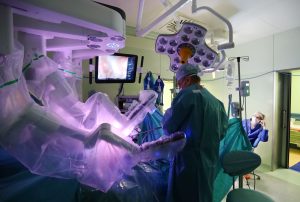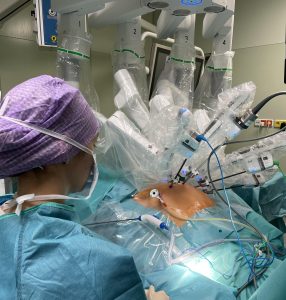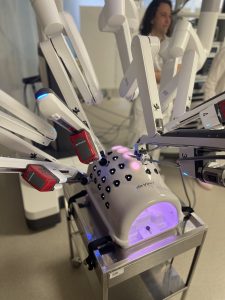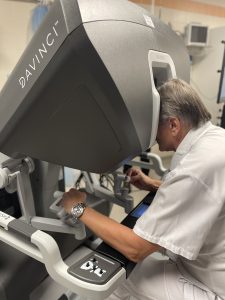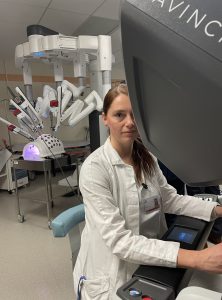Robotic Centre
Hospital Jihlava, contributory organisation
Robotic Centre
At the beginning of 2023, the robotic centre of the Hospital in Jihlava was launched, becoming one of the 13 providers of this cutting-edge surgical technology in the Czech Republic. Robotic surgery is now an integral part of advanced oncological care provided at Comprehensive Cancer Centres in university and regional hospitals. The Comprehensive Oncology Centre of the Hospital in Jihlava, in cooperation with individual clinical disciplines, has for many years been providing cutting-edge care to patients from the Vysočina Region. The launch of the robotic centre is a proof of the hospital management's efforts to keep pace with other centres in the Czech Republic in providing the most advanced medical care.
Robotic surgery
Long-term monitoring in the Hospital Jihlava confirmed the demand for robotic surgery by patients, where this surgery reduces not only the time of hospitalization, but also the time of overall recovery and incapacity for work due to low pain. It also reduces the incidence of adverse post-operative complications, which affect quality of life and prolong the return to normal working and personal life.
Compared to conventional surgery, robotic surgery brings greater precision, lower risk of blood loss, fewer infections, and, compared to laparoscopy, significantly lower need for conversion to open surgery due to greater flexibility and precision. In the surgical treatment of oncological diseases in particular, the rapid emergence of robotic-assisted procedures has been observed in the last few years, which is related to the above-mentioned facts.
In the Czech Republic, in urology, in the case of localised prostate cancer, almost 80% of its removal is performed robotically, with an annual increase of around 10% in recent years. Robotic procedures in the case of removal of kidney tumours (partial nephrectomies) are also growing rapidly, and robotic-assisted procedures in gynaecology are increasing significantly, with an annual increase of over 80%, as is the case in general surgery, where the annual increase is over 50%.
In international studies, kidney cancer surgery has a significantly lower mortality rate, 44% lower need for blood transfusions, 42% lower incidence of postoperative complications, 39% lower incidence of complications in the 30 days following surgery, and 36% lower need for rehospitalization compared to open surgery. When compared with laparoscopy, the need for conversion to open surgery and revision is 52% lower when using the robot. Similarly, the need for blood transfusions is reduced by 24%, as well as postoperative complications by 21%, and a 17% lower need for rehospitalization is recorded compared to laparoscopy.
When removing the prostate, because of localized cancer, long-term statistical results favor robotic-assisted surgery over open surgery or laparoscopy.
This is due to a significantly lower incidence of complications during and immediately after surgery, better results associated with the radicality of the procedure, lower number of transfers to conventional surgery compared to laparoscopy, and lower need for blood transfusions, with an average operative blood loss of around 200 ml.
In gynaecological surgery for robotic-assisted hysterectomy for endometrial carcinoma, according to the evaluations performed, the time of the robotic procedure coincides with laparoscopy, but the latter allows for less blood loss and shorter hospitalisation, which on average is around 2.7 days. The probability of open surgical revision and completion of the procedure is approximately 52% lower, and the possibility of death in the postoperative period is significantly reduced. Even in the field of gynecology, robotic-assisted surgery results in 26% fewer complications, 25% fewer blood transfusions, and 20% fewer patients returning to the hospital as opposed to laparoscopic surgery.
In surgery, robotic surgery is currently indicated most often for certain types of colon tumours. Patients for whom this type of surgery is suitable have a milder postoperative course compared to conventional surgery. As a result, the time required for a stay in the intensive care unit is reduced. The high precision of the robotic system, as in other surgical disciplines, is associated with a lower incidence of postoperative complications and the need for blood transfusions. Compared to laparoscopic surgery, surgery is approximately 40% less likely to need to be converted to open surgery. Due to these advantages, the overall length of hospital stay is significantly shorter and the patient is about 20% less likely than other types of surgery to have to return to hospital with a complication. This is particularly important for cancer patients, as the shorter post-operative recovery time means they can have further cancer treatment sooner if they need it.
Start of robotic surgery in Hospital Jihlava
Two years of preparation preceded the start of operations. Hospital Jihlava, through its management, analyzed the suitability of such a project from both a medical and economic point of view, and then stood up to the negotiations of the instrument committee of the Ministry of Health. All conditions for a major investment in robotic surgery were met, which was helped by the REACT-EU grant programme from the European Union. In addition to the robotic system, Hospital Jihlava invested in a special operating table that allows changing the patient's position during the operation, without the need to interrupt the surgery. It was necessary to adapt one of the operating theatres to robotic surgery and practically take it out of use for conventional surgery. The reorganisation of the central operating theatres required a great deal of understanding and cooperation between all surgical disciplines.
In the last 3 months of 2022, intensive training of all staff of the robotic centre took place under the supervision of company experts, which took place during non-working hours. A lot of time was devoted to mastering the routine operation of the robotic system by the paramedical staff and doctors from the relevant clinical disciplines of gynaecology, surgery and urology. The doctors practiced the actual operating technique on the operating console simulator. Time and accuracy of the tasks were assessed by expert trainers. After 3 months of intensive training, all doctors passed their final exams in training centres abroad.
The Jihlava Robotic Centre is thus a certified workplace for the provision of robotic-assisted surgery.
Doctors from the Jihlava hospital cooperate with top robotic workplaces from the university hospitals in Prague and Olomouc, they use valuable advice from experts who have been working on this surgery for many years and often visit the Jihlava robotic centre. Cooperation with experts from abroad is being prepared.






